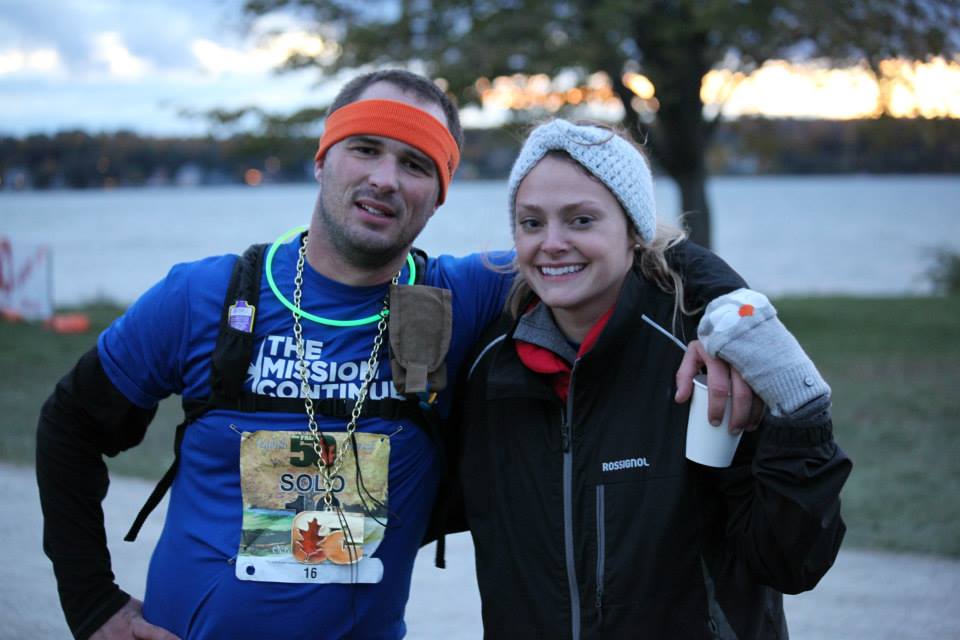Pain Shared Is Pain Divided
Aug 16, 2014

David Chrisinger
August 16, 2014

“Veterans have the greatest capability for healing when the profound grief and the traumas experienced are both acknowledged and cared for.” – Michelle Lewis, “Grief, Trauma and Combat”
_____
Most traditional warrior societies developed elaborate rituals that helped cleanse their warriors of guilt and shame. The rituals imparted on them spiritual wisdom that they could use to become role models and leaders. The Hopi, for example, would purify their warriors by ritualistically washing their returning warriors’ hair. They would even then give them new names. It was thought that by washing away the blood, sweat and dirt of war and by giving the warriors new names, the warriors would be afforded the opportunity to live the rest of their lives as new men, untainted by the trauma of war.
Moreover, before the warriors could return to their homes, they had to first spend a day or two with clan members, sharing their stories of war. The clan members — veterans of war themselves — would help reassure the warriors that not only had they fought for their community, but that every person in the community knew their lives depended on men like them.
According to Lieutenant Colonel Dave Grossman, these sorts of rituals provided warriors a way to rid themselves of the “stress and the terrible guilt that always accompanies the sane after war.” They were also a way of “treating guilt by providing a mechanism through which fighting men could decompress and relive their terror without feeling week or exposed.” Lastly, these rituals helped to reassure returning warriors that what they did was right and that the community for which they fought was grateful and welcomed them back.
In more recent history — after the Second World War, for example — our returning troops went through similar rituals on their way home from war. They may not have had their hair ritualistically washed or their names changed, but they did spend days, sometimes weeks, together aboard troopships in which they were able to deal with their feelings of guilt and shame. This short period of isolation and decompression afforded them the opportunity, according to Richard Gabriel, to “relive their feelings, express grief for lost comrades, tell each other their fears, and, above all, receive the support of their fellow soldiers.” Then, once they reached American soil, they were greeted as heroes, honored by a grateful nation with parades and other tributes. They were also received with respect by their respective communities.
Put simply: They had the social support they needed to come to terms with what they had experienced.
When returning troops are denied these sorts of rituals, they may struggle to purge their guilt or come to terms with what they had been asked to do. Vietnam veterans, for example, were denied the isolation and decompression of a long voyage home. Instead, they were put on a flight “back to the world” and were oftentimes sleeping in their own beds at home mere days after leaving a fox hole. On top of that, some Vietnam veterans were either reviled or treated with shattering indifference because, according to Dr. Aphrodite Matsakis, they “represented a painful episode in our history.”
When our troops began coming home from Iraq and Afghanistan, many vowed not to subject them to the same painful homecoming felt by many Vietnam veterans. We threw boisterous parades, bought yellow ribbons to show our support, thanked them before professional sporting events, and offered them all matter of discounts and giveaways. Many came to believe, in turn, that all that was needed to save this new generation of veterans from the harmful effects of having been to war was an emphatic “thank you.”
Unfortunately, as David Philipps pointed out in his book “Lethal Warriors” the combat stress and moral injuries that go unaddressed in our returning troops do not simply disappear. Instead, they can seep into society. “They become alcoholism and domestic violence, divorce, unemployment, drug abuse, and bad parenting,” says Philipps, “that can echo for generations.”
_____
Two weeks after he graduated from high school, my best friend, Brett Foley left for Marine Corps boot camp in California. During his first couple of years, he and the rest of his fellow infantrymen went through months of specialized training that prepared them to be sent to some of the deadliest places in Iraq and Afghanistan. They had learned to push problems aside, to “suck it up.” The mission was what mattered. If you couldn’t stay squared away, the Corps couldn’t use you.

Three years ago, Brett came home from Afghanistan — his second and final combat deployment. Happy to finally be home, he felt like his greatest battles were behind him. A few months later, however, he found himself struggling with alcohol abuse and post-traumatic stress, unable to admit what had become of him.
“When Brett first got home,” his wife Whitney told me last year, “there was a lot of anger on his part. He was depressed, in denial, angry, lost, insecure, and unsure of himself. He slept a lot. He drank a lot. He refused to believe he had post-traumatic stress. It took a lot of persuasion to get him to go and see a psychologist.”
It wasn’t guilt or shame, however, that fueled Brett’s discontent. What hurt most was the fact that he felt insignificant. After five years in the Marine Corps, seemingly always going somewhere, Brett came home for good and found himself on the outside, seemingly going nowhere in particular. While in the Corps’ cloistered universe of regimental life, Brett had a place. The instant, however, that he took off his uniform for the last time, that status vanished. Even after he found a job and started going to school he still felt out of place and unimportant.
_____
Reassure our veterans that they are still needed here at home.
The first step Brett had to take was realizing that he didn’t need to be in the military to be important. “While I was in the Marines,” Brett told me, “I had a sense of purpose and I knew exactly what I was supposed to do every day. I knew I was helping people. When I got home, I had a hard time reproducing that feeling.”
When he first got home, Brett was treated more often with sympathy — “I’m so sorry you had to go to war” — than empathy — “It must have been rough over there. What are you going to do now?”
“It made things worse,” Brett told me, “when people tried to sympathize with me. It made me feel like there was something wrong with me — that no one expected anything of me anymore.”
During our many conversations since he got home, Brett and I talked quite a bit about “The Greatest Generation.” We talked about how they were great because of the challenges they faced — not despite them. We talked about how we as a nation expected great things out of The Greatest Generation and how many post-9/11 veterans don’t feel like anyone expects anything from them.
“After I had been home for a while,” Brett told a crowd at our hometown’s Veterans Day program this year, “I started to realize that they faced the same challenges when they got home that I did when I got home. The difference was that when they got home, they searched for a new purpose, a new direction. That’s what I needed. I needed to find a new goal. I needed a new purpose. I realized that I had the skills I needed to have a good life. I realized that even though bad things had happened to me — that didn’t mean I had to have a bad life.”
Brett completed the police academy this past summer and will finish his criminal justice degree this December. He realizes now that he can use the skills he learned in the military to help people here at home. By becoming a law enforcement officer, Brett has found a new way to help.
Help veterans heal by listening to what they have to say.
Before he came to the realization that he could continue serving his community, Brett had to first find a way to heal from the trauma he experienced in combat. He and I found that simply talking about his experiences — confronting what hadn’t been confronted and integrating what hadn’t been integrated — helped him make sense of the seemingly senseless trauma that was keeping him from putting the wars behind him.
After we had been talking for a month or so, I suggested that Brett write about his experiences. I always found that writing about things that were bothering me helped give me insight and clarity. I hoped that Brett would find the same to be true for him.
“My memories and the harmful effects of the trauma I experienced didn’t just disappear,” Brett told me. “But I feel like the more I wrote the more things started to make sense.”
According to Dr. Matsakis, the types of emotional and psychological symptoms that are associated with Post-Traumatic Stress Disorder may never be totally eliminated: “They stay a permanent part of the person, just as the stones surrounded by tree roots become ‘part of’ the tree. In the same way that roots can move far past the stones in their path to new territory, so can combat vets — or their partners — integrate and grow beyond their traumas and struggles.”
By writing about his trauma, Brett created a narrative that helped him make meaning of the seemingly meaningless. Experiences that he once saw as chaotic and senseless were made purposeful. Through his writing, the rawness of his memories was diminished and he came to realize that he could have a new purpose in this world.
Encourage veterans to share their experiences with others.
I encouraged Brett to share his experiences with others. I thought that by sharing his stories, Brett would be better able to reconnect with those friends and family members he had been forced to disconnect from while he was in combat. I also thought that if he shared his struggles (as well as his triumphs), he could show other combat veterans that they are not alone. Lastly, it was my hope that if Brett found the courage to share his stories, others would find the courage to share theirs as well.
We also decided to look for a way we could help other returning veterans — those who were struggling with the same issues Brett was struggling with. Both of us thought it would be a good thing to do to help take Brett’s mind off his own struggles. Through my research, I came across The Mission Continues and was blown away by how intuitive and powerful what they are doing is: Helping veterans transition to civilian life by giving them an opportunity to continue serving in their communities.
When I told Brett about The Mission Continues — how they were helping veterans find renewed strength and purpose by asking them to continue serving — he suggested we help them by making it our mission to help raise money and awareness. “But how?” I asked.
“What if we run a marathon?” Brett suggested.
“How about if we run 50 miles?” I replied.
I thought that Brett would balk at my idea. I was wrong. Without hesitating, he agreed. A few weeks later, we signed up to run The Fall 50 in Door County, Wisconsin.
It wasn’t long thereafter that our website (http://running50.com) was born.

During the course of about four or five months, Brett and I wrote more than 100 articles. Some told stories of Brett’s service and time in combat. Others were about issues facing post-9/11 veterans and what organizations like The Mission Continues are doing to help. Eventually, other veterans we met decided to share their stories on our site as well.
It wasn’t long after we launched the site that people started taking an interest in what we were doing. It all started when our hometown newspaper began printing a number of stories about “Running 50” and Brett’s transition back to civilian life. After that, our hometown news channel ran a couple of stories on the nightly news. We also got an invitation from a professor at my alma mater — The University of Wisconsin-Stevens Point — to come and talk to his class about running and the meaning of life. By the time the race was upon us, Brett’s story had been shared. All that was left was to run 50 miles.
_____
The Race
With 10 miles left to go, Brett and I both had hit a wall. By that point, we had been running for about nine hours. “I was beaten and I just wanted to sit down and stop,” Brett wrote after the race. “I had had enough 20 miles ago and now things were horrible. Whitney hugged me and said, ‘Remember what you’re doing this for.’ That was when everything just snapped inside my head. All the darkness went away, and I thought, ‘She’s right, there are guys that would kill to be able to use their legs again or take another step, or hug their children, or hold their wives. Some of them will never be able to do that again, so what the fuck do I have to complain about? I gave her a kiss and took off.”
And just like that, Brett was gone. Through sheer force and indomitable will, he tapped into something I don’t know that he even knew he had. He covered the last 4.7 miles in 40 minutes, an amazing show of mental and physical toughness for anyone — let alone someone who had already been running for more than 10 hours.

As he neared the finish line, he started to feel the powerful emotions that come when you’ve achieved something truly great. “I remember thinking that this was awesome,” Brett wrote after the race, “and that I didn’t remember too many times in my life that I felt like that. I was proud of myself for doing it and honored that I got to share the experience with such great people.”
“Overall, this race was one of the best things I’ve ever done in my life,” Brett continued. “I learned a lot about myself and I learned a lot from Dave. I’m glad that we could raise some money for The Mission Continues. This whole process has really helped me battle the demons I was dealing with after the military, and I think it is starting to help others like me.”
As for me, working with Brett on this project has taught me two things. The first is that suffering is humbling — and useful. The second is that running ultra-endurance races and life share a number of characteristics, chief among them the fact that you don’t have to be fast — all you have to be is fearless.
You have to be fearless because you can’t know how hard it’s going to be. All you can do is show up, toe the start line, control what you can control, and not worry about the rest.
Running and life depend on the same things, says author Christopher McDougall: “loosening your grip on your own desires, putting aside what you wanted and appreciating what you got, being patient and forgiving and undemanding.”
_____
Above all else, everyone desires to feel like they matter. For Brett, he was able to conquer his demons by talking and writing about his experiences; sharing those experiences with his friends, family, and community; and running 50 miles to support the work of an organization that helps people like him put back together the pieces of their lives that were shattered by war.
Finally, one thing is certain: Only by having an honest conversation about the true nature of war will we find ways to help our veterans heal, to reassure that that their recovery is our collective responsibility, and to show them that they are not alone.
 You are successfully logged in.
You are successfully logged in.





